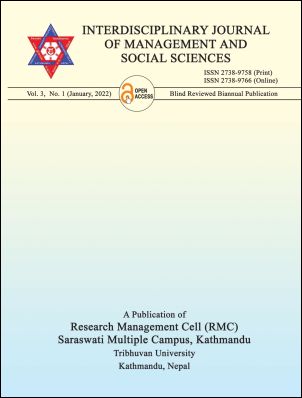Human Resource Practices and Employee Satisfaction in Nepalese Commercial Banks
DOI:
https://doi.org/10.3126/ijmss.v3i1.50238Keywords:
recruitment and selection, training and development, compensation policy, performance appraisalAbstract
This study examines the impact of human resource practices on employee satisfaction in Nepalese commercial banks. Employee satisfaction is a dependent variable. The independent variables are recruitment and selection, training and development, compensation policy, and performance appraisal. Research is conducted using primary data collecting opinions of 389 respondents from Kathmandu city. Structured questionnaires were used for the survey comprising a five-point Likert scale withcross-sectional data. The correlation and regression were used to identify the association and impact of an independent variable on employee satisfaction. The result shows that recruitment and selection, training and development, compensation policy, and performance appraisal found a positive correlation with employee satisfaction. This study and its results would be helpful for executives of commercial banking institutions while making the decision and it provides the foundation to project and mitigate the issues associated with employees. So, this study provides deeper insight into the existing scenario of human resource practices and their relations with employees’ satisfaction. Future research can be conducted comprising the further variables of human resource practices and even with the accumulation of more data to assess the further consequences and impact. Thus, the linkage of demographic variables as moderating effects can be examined in future studies.

